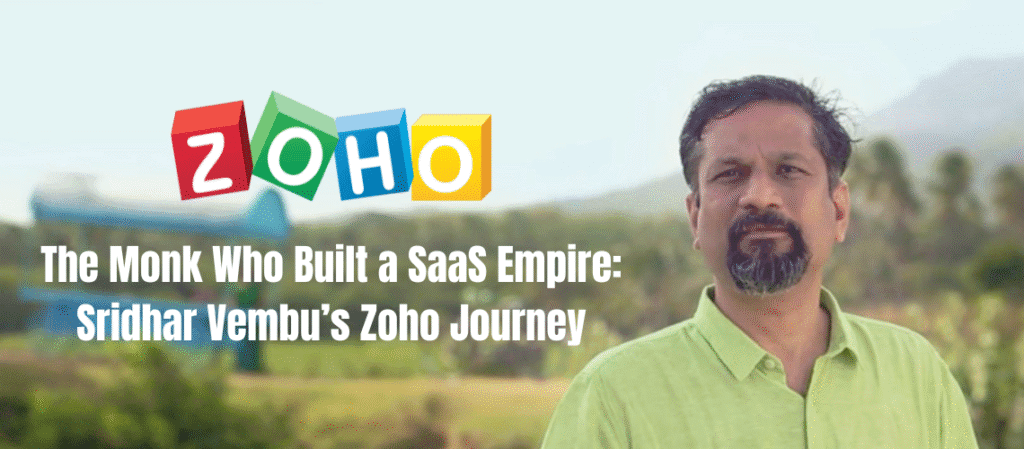Chennai, Tamil Nadu — In an era when startup founders chase VC rounds and media spotlight, Zoho Corporation and its low-key co-founder Sridhar Vembu have built a rare, billion-dollar enterprise software company — quietly, ethically, and profitably. What began in a modest home in California is now a global SaaS force with over 100 million users, ₹8,700+ crore in revenue, and a deep commitment to rural innovation in India.
🛠️ The Startup Story: AdventNet to Zoho
The roots of Zoho trace back to 1996, when Sridhar Vembu and his brothers co-founded AdventNet Inc. in the U.S. with zero external funding. The company initially focused on network management tools for telecom clients.
By the early 2000s, Sridhar foresaw a shift toward cloud-based applications. In 2009, AdventNet was rebranded as Zoho Corporation, pivoting fully to enterprise SaaS products.
Its flagship product, Zoho One, now competes globally with Microsoft and Salesforce, offering an integrated suite of over 50 cloud-based applications—from CRM and accounting to HR and communication tools.
🚀 Scaling Without VC: A Masterclass in Bootstrapping
In a world obsessed with funding rounds and unicorn status, Zoho took a different route. The company is 100% bootstrapped and profitable, with no venture capital or IPO dilution.
Zoho’s revenue crossed ₹8,703 crore (approx. $1.04 billion) in FY23, with a net profit of ₹2,836 crore. Most notably, Zoho owns its tech stack end-to-end, including data centers and custom chips—allowing deep product control and high margins.
Unlike many SaaS startups that burn cash for user acquisition, Zoho invests 50% of its revenue back into R&D.
🗣️ “We are not in a race. We are on a journey,” says Sridhar Vembu, emphasizing sustainable growth over hyper-scaling.
🌾 The Rural Revolution: From Silicon Valley to Tenkasi
Perhaps Zoho’s most radical move was Sridhar Vembu’s relocation to rural Tamil Nadu in 2020. Instead of leading from an urban HQ, Vembu now operates from a village near Tenkasi, employing and training local youth.
Through Zoho Schools of Learning, rural high-school graduates are trained in programming and design—many of whom now build software used by businesses in over 150 countries.
This rural-first approach challenges India’s city-centric tech model and has become a case study in decentralized innovation.
🤖 The AI Age & Beyond
At its 2025 ZohoDay conference, Zoho unveiled major AI upgrades:
- Generative AI features across the Zoho suite
- Zoho Ulaa, a privacy-first enterprise browser
- A focus on AI governance, with Sridhar warning that mass automation could bankrupt the middle class if policy doesn’t intervene.
Zoho is not just using AI — it’s commenting on the societal impact of AI, urging for human-centered design and economic balance.
🧱 Culture, Control & Character
Zoho’s unique culture is rooted in:
- No external investors — full control of strategy
- Long-term thinking — no quarterly pressure
- Deep ethics — no ads, no user tracking, no data-selling
- Minimalist leadership — Sridhar lives modestly, often biking to work
This rare combination of profit, purpose, and principles has made Zoho a respected name among global business thinkers.
🏁 What’s Next?
Zoho continues to invest in rural campuses, global offices (like its new U.S. tech hub in Texas), and advanced chip R&D. It also plans to push further into finance, ERP, and industry-specific solutions.
📊 Key Milestones
| Year | Milestone |
|---|---|
| 1996 | Founded as AdventNet Inc. in California |
| 2009 | Rebranded to Zoho Corporation |
| 2017 | Launched Zoho One (50+ integrated SaaS apps) |
| 2020 | Sridhar Vembu moved to Tenkasi, Tamil Nadu |
| 2023 | Crossed ₹8,700 crore in revenue, ₹2,800 crore profit |
| 2025 | 100M+ users globally; focus on AI & rural expansion |
🔚 Final Word
Zoho’s journey is proof that you don’t need flashy pitches or endless funding to build something extraordinary. With a clear vision, ethical leadership, and deep commitment to India’s grassroots, Sridhar Vembu’s Zoho has redefined what it means to be a founder in the 21st century.


